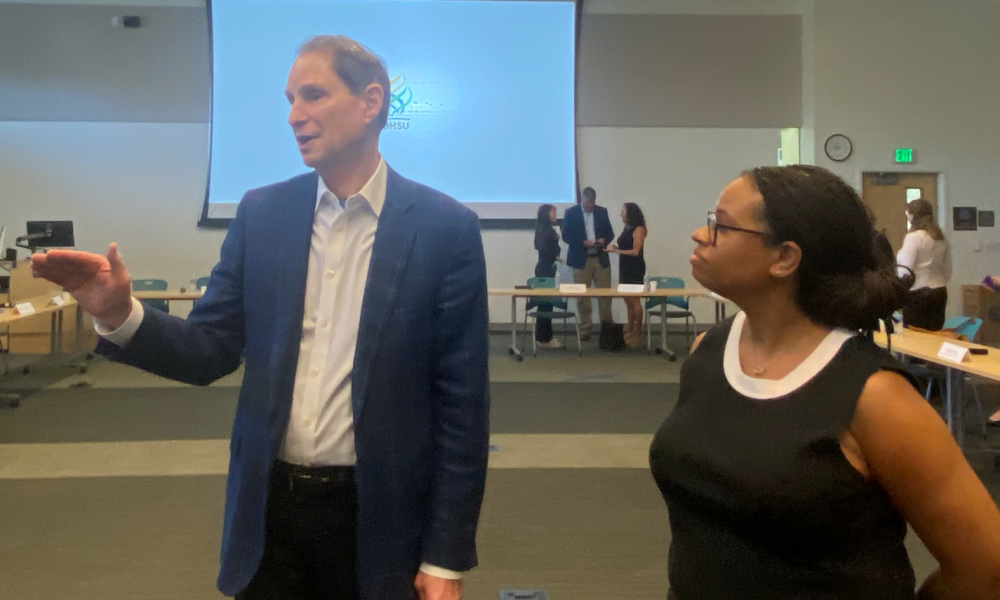Oregon’s mental health professionals for young people are frustrated.
At a roundtable discussion on Thursday, medical providers and representatives from a tribal health agency and Portland Public Schools expressed frustration that public and private health insurance plans have left many youth untreated.
They called for an expansion of the mental health care workforce in schools, and an overhaul of outdated regulations that restrict care settings and providers. They also said the federal government needs to hold insurers accountable for denying behavioral health care coverage to kids.
The roundtable was convened at a southwest Portland campus of Oregon Health & Science University by Oregon’s U.S. Sen. Ron Wyden. He was joined by Chiquita Brooks-LaSure, head of the federal Centers for Medicare and Medicaid Services, as well as parents and students, to discuss youth mental health care going into the new school year.
Wyden said kids in Oregon have been “sounding the alarm clear and loud,” that more mental health support is needed.
The other participants agreed.
A survey of about one-third of Oregon students conducted in 2020 by the Oregon Health Authority and the Oregon Department of Education found nearly half felt sad or hopeless for more than a two-week period. And a report released this week by the Annie E. Casey Foundation, found that the number of Oregon children struggling with mental health issues grew from 11% in 2016 to 16% in 2020, a 40% increase.
Wyden said the pandemic exacerbated the mental health crisis in Oregon’s kids. “This has been an issue before the pandemic, and it’s mushroomed,” he said.
Wyden, Brooks-LaSure and health care providers agreed that schools need more counselors and therapists. They said Medicaid needed to provide greater access to mental health care.
In Oregon, about two in five children are insured through Medicaid, the federal program that covers low-income families. Nationwide, nearly half of kids receive free coverage from Medicaid and the Children’s Health Insurance Program, or CHIP.
Expanding the workforce
In 2019, the state allocated more than $1 billion to the Student Success Act in 2019, which helped pay for mental health care in schools. Additionally, Oregon received millions from the American Rescue Plan during the pandemic, with directives to use some of it for mental health staff and programs.
But the money has not solved the problems, according to Colt Gill, the director of the Oregon Department of Education.
“The Student Success Act gave us money for more counselors,” Gill said in a November meeting of the Oregon Senate’s Education Committee. “We cannot find them.”
One mother said during the discussion that her son has been on a waiting list to see a school counselor for six months.
Brooks-LaSure said her agency is accepting public comment on a policy that would increase the number of mental health care providers in schools by giving counselors more flexibility in who they treat and their focus. As an example, they could treat school children and veterans, or they could work in schools but also offer family counseling. This would bring in professionals who do not work in schools now. The public can submit comments until the end of August.
Rep. Lisa Reynolds, D-Portland and a pediatrician, said about 30% of her patients are on Medicaid. Some wait weeks or months to see a therapist because of the shortage of mental health professionals.
Reynolds said more doctors need to be trained in mental health care, and that payments to social workers, counselors and therapists should increase. Although Oregon regulations require equal payments for physical and mental health care, therapists are typically paid less than those providing physical care. Increasing payments would increase the numbers of professionals, she said. “We need to compensate mental health care providers the same as we do physical health care providers,” she said.
Randy Kamphaus, director of the University of Oregon’s new Ballmer Institute for Children’s Behavioral Health in Portland, which offers curricula to students interested in the field, added that interns should be paid while they are training. The institute’s first class of 200 undergraduates will intern in Portland Public Schools in the fall of 2023, Kamphaus said. They’ll start by screening students to identify those at risk or susceptible for mental health problems.
Outdated regulations hinder progress
Many of the medical providers on the panel expressed frustration with policies under Medicaid that restricts care.
Laura Platero, executive director of the Northwest Portland Area Indian Health Board, said a restriction that only allows providers to claim a reimbursement when care is provided in a facility has been especially restrictive. She told Brooks-LaSure that Medicaid should be extended to tribal practices, such as the Healing of the Canoe program for Native American youth. The curriculum includes tribal traditions and practices to strengthen children’s connections to their culture and to combat suicide and substance abuse.
She said her agency has struggled to help kids with their mental health.
“We’ve had a hard time finding in-patient treatment for youth, and when we do we have to wait or it’s too expensive,” she said.
Robin Henderson, chief executive for behavioral health at Providence, said she oversees the only child psychiatric unit in the state and that it often has a waiting list. She said administrators face the biggest problem with reimbursements from private insurers. All insurers in Oregon are supposed to include the clinic in their network but she said many aren’t.
“We need regulators to hold insurers accountable,” she said.
She criticized the requirement by some insurers for prior authorizations before allowing treatment. Many often deny coverage, she said.
“I can’t tell you how many times I’ve heard back ‘well that’s a behavioral health problem,’” Henderson said. She called on Wyden to continue to push for insurance reforms in Congress.
Money approved for school counselors
Wyden said a “resounding call for help” from students pushed the recent Safer Communities Act over the finish line. The act, which includes $1 billion for school counselors over five years, was embedded in a gun safety bill that Congress passed in June.
An Oregon student, Trace Terrell, a senior at La Pine High School, testified in favor of the measure before the U.S. Senate Finance Committee, which Wyden chairs. Terrell said about 80% of his peers who were referred for counseling never heard from a counselor.
Wyden said Thursday that Terrell’s testimony had a profound impact on the committee, which played a major role in writing the gun safety bill.
Wyden said more help is coming. He indicated that the Congress is likely to pass a “major bipartisan package” to help states add youth mental health professionals.
Oregon Capital Chronicle is part of States Newsroom, a network of news bureaus supported by grants and a coalition of donors as a 501c(3) public charity. Oregon Capital Chronicle maintains editorial independence. Contact Editor Lynne Terry for questions: [email protected]. Follow Oregon Capital Chronicle on Facebook and Twitter.
STORY TIP OR IDEA? Send an email to Salem Reporter’s news team: [email protected].

Alex Baumhardt has been a national radio producer focusing on education for American Public Media since 2017. She has reported from the Arctic to the Antarctic for national and international media, and from Minnesota and Oregon for The Washington Post. She previously worked in Iceland and Qatar and was a Fulbright scholar in Spain where she earned a master's degree in digital media. She's been a kayaking guide in Alaska, farmed on four continents and worked the night shift at several bakeries to support her reporting along the way.









